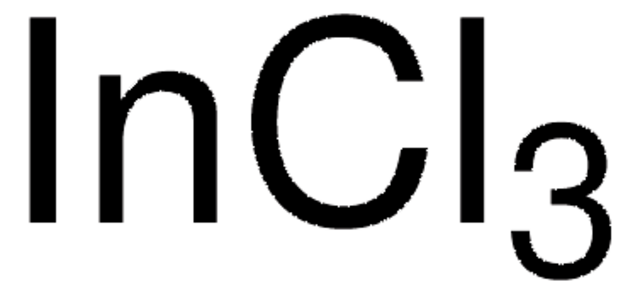651745
Copper(I) chloride
AnhydroBeads™, ≥99.99% trace metals basis
Sinónimos:
Copper monochloride, Cuprous chloride
About This Item
synthesis grade
Productos recomendados
grade
for synthesis
synthesis grade
Quality Level
vapor pressure
1.3 mmHg ( 546 °C)
product line
AnhydroBeads™
assay
≥99.99% trace metals basis
reaction suitability
reagent type: catalyst
core: copper
impurities
≤100.0 ppm Trace Metal Analysis
bp
1490 °C (lit.)
mp
430 °C (lit.)
solubility
slightly soluble 0.47 g/L at 20 °C
application(s)
battery manufacturing
SMILES string
Cl[Cu]
InChI
1S/ClH.Cu/h1H;/q;+1/p-1
InChI key
OXBLHERUFWYNTN-UHFFFAOYSA-M
¿Está buscando productos similares? Visita Guía de comparación de productos
Categorías relacionadas
General description
Application
Legal Information
For use with
signalword
Danger
Hazard Classifications
Acute Tox. 4 Dermal - Acute Tox. 4 Oral - Aquatic Acute 1 - Aquatic Chronic 1 - Eye Dam. 1 - Skin Irrit. 2
Storage Class
8A - Combustible corrosive hazardous materials
wgk_germany
WGK 3
flash_point_f
Not applicable
flash_point_c
Not applicable
ppe
dust mask type N95 (US), Eyeshields, Faceshields, Gloves
Elija entre una de las versiones más recientes:
¿Ya tiene este producto?
Encuentre la documentación para los productos que ha comprado recientemente en la Biblioteca de documentos.
Los clientes también vieron
Artículos
Nanostructured Materials Through Ultrasonic Spray Pyrolysis
Advances in materials have often been led by the development of new synthetic methods that provide control over size, morphology and structure. The preparation of materials in a scalable and continuous manner is critical when development moves beyond lab-scale quantities.
Spectral conversion for solar cells is an emerging concept in the field of photovoltaics, and it has the potential to increase significantly the efficiency of solar cells. Lanthanide ions are ideal candidates for spectral conversion, due to their high luminescence efficiencies and rich energy level structure that allows for great flexibility in the upconversion and downconversion of photons in a wide spectral region (NIR-VIS-UV).
The prevailing strategies for heat and electric-power production that rely on fossil and fission fuels are having a negative impact on the environment and on our living conditions.
Nuestro equipo de científicos tiene experiencia en todas las áreas de investigación: Ciencias de la vida, Ciencia de los materiales, Síntesis química, Cromatografía, Analítica y muchas otras.
Póngase en contacto con el Servicio técnico









